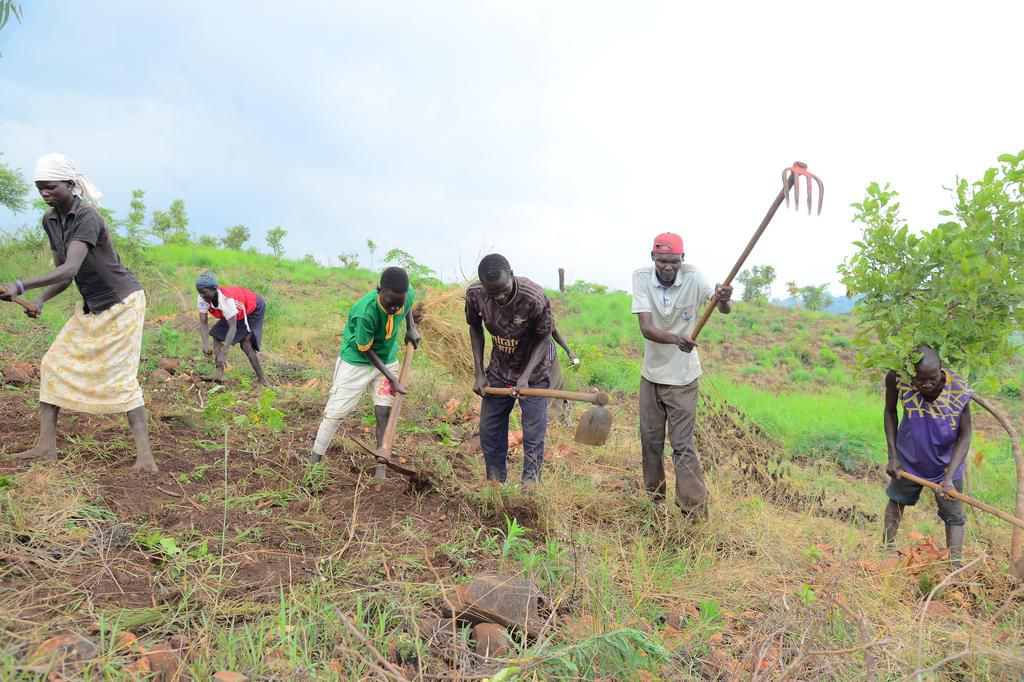Refugee host community rehabilitates 2,278 hectares of degraded land
)
"I stopped the people from cutting down trees. Currently, we are planting more which is why the area is green now. I also pay all the workers UGX 5,000 ($1.3) per day for planting trees," Ezati shared.
His initiative has seen the mobilization of small plots of land where trees are intercropped with food crops like sorghum and cassava, primarily to enhance food security.
The once lifeless area has begun to thrive again, thanks to these replanting efforts. The return of birds and butterflies signifies the positive impact on the local ecosystem. Ezati credits much of this transformation to his collaboration with the Ecological Christian Organization.
"My life changed when I started working with the Ecological Christian Organization. The knowledge they shared with us about the environment was eye-opening, and also the tools, logistics, and seedlings to plant trees made a huge impact on our lives," Ezati revealed.
Through the concerted efforts of Ezati and his colleagues, a remarkable 2,279 hectares of forest and about 400 hectares of wetlands have been restored in the district over recent years. This accomplishment is particularly significant in Terego District, a major host of hundreds of refugees, primarily from the neighboring South Sudan.

As World Refugee Day approaches, it is important to note that Uganda is home to over 1.6 million refugees from countries such as South Sudan, the Democratic Republic of Congo, Rwanda, Somalia, and Eritrea. The influx of refugees places additional strain on the environment, as both refugees and host communities vie for resources like wood fuel.
The current tree-planting efforts are part of a four-year collaboration between refugees and the host community in Terego District. Funded by the European Union Emergency Trust Fund for Africa, the project aims to restore and conserve degraded ecosystems to improve community livelihoods for both refugees and host communities in Uganda’s West Nile and Albertine Regions. The project is implemented by the Uganda Biodiversity Fund in collaboration with the Ecological Christian Organization, the Wildlife Conservation Society, and Nature Uganda.
Harriet Tumushabe, the Project Manager and representative of the Uganda Biodiversity Fund, Wildlife Conservation Society, and Nature Uganda, emphasized the project's goals and progress.
"The European Union invested Euro 5.4 million, which is about UGX 21.4 billion, in the restoration of degraded ecosystems in Terego, Yumbe, Kyegegwa, Kikuube, and Kamwenge districts," she said.
Despite interruptions caused by the Covid-19 pandemic, the project has made significant strides since its inception in 2020. "The project has enhanced the adoption of sustainable land management practices, agroforestry, climate-smart agricultural practices, and woodland establishment," Tumushabe added. The project has successfully restored 2,279 hectares of degraded forests and woodlands and 400 hectares of wetlands and riverbanks.
This initiative aligns with the European Union's response to increased environmental degradation by promoting alternative energy sources in Uganda's refugee-hosting areas. The project implementers have achieved their overall goal of restoring degraded forests, savanna woodlands, and wetlands in the targeted regions. "We have so far restored 353 hectares of central forest reserves and established 596 hectares of woodlots. We have promoted agroforestry practices and sustainable land management practices," Tumushabe noted.
Additionally, the project has introduced alternative sources of livelihood, such as fruit planting and beekeeping, to sustain families and deter them from engaging in environmentally harmful activities like charcoal burning.
Robert Ezati's dedication and the collaborative efforts of various organizations have not only revitalized Terego's environment but also provided a blueprint for sustainable development in the face of adversity. As these efforts continue, they offer hope for a greener and more resilient future for both the local communities and the refugees they host.
)
)
)
)
)
)
)